AMERICAN TRAGEDY BECOMES MUSICAL COMEDY
1931 was a crossroads in American history. With no economic recovery in sight, the Depression had people edgy, and when Americans are edgy, they are discordant. An acrimonious populace is a perfect breeding ground for intolerance. As such, issues that were quelled during the over-consuming, over-spending 1920’s were coming to 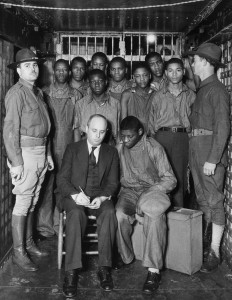 a head, both socially and politically. Liquor was still prohibited, the party was over, and people were desperate for scapegoats other than bankers to blame for their ills, hence the racial prejudice that blossomed in that era.
a head, both socially and politically. Liquor was still prohibited, the party was over, and people were desperate for scapegoats other than bankers to blame for their ills, hence the racial prejudice that blossomed in that era.
By 1931, just as Woodrow Wilson predicted before WWI, Americans forgot that there ever was such a thing as tolerance. While anti-immigration bills were passed, and anti-Semitism was on the rise, it was the black population that really had to watch their backs: The Civil War remained a huge, unresolved sore spot; Jim Crow laws were firmly entrenched; minstrelsy still had an audience in the South; the controversial movement known as eugenics – which studied the methods of improving the quality of the human race, especially by selective breeding – had taken a toe-hold in the country; and D.W. Griffith’s Birth of a Nation (1915) gave rise to the “second era” Ku Klux Klan – by 1925, the Klan peaked at over 5 million members.
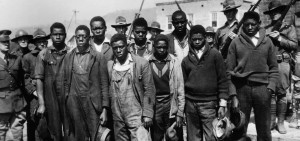 It was in this fecund atmosphere for bigotry that nine African-American teenaged boys, some simply seeking employment and a better life, were hoboing on a freight train between Chattanooga and Memphis; also on the train were some white males and two white women, Ruby Bates and Victoria Price. A fight broke out between the two races, and the white men were thrust from the train. When a posse arrested the black boys for assault, the two girls came forward and announced that they had been raped. After a series of trials, all but one of the boys (ages 13-19) were convicted and sentenced to death. Even after the case went to the Supreme Court twice, and Bates later recanted her testimony, guilty verdicts continued to be handed down, and five of the boys stayed in prison for years, the last one being paroled in 1950.
It was in this fecund atmosphere for bigotry that nine African-American teenaged boys, some simply seeking employment and a better life, were hoboing on a freight train between Chattanooga and Memphis; also on the train were some white males and two white women, Ruby Bates and Victoria Price. A fight broke out between the two races, and the white men were thrust from the train. When a posse arrested the black boys for assault, the two girls came forward and announced that they had been raped. After a series of trials, all but one of the boys (ages 13-19) were convicted and sentenced to death. Even after the case went to the Supreme Court twice, and Bates later recanted her testimony, guilty verdicts continued to be handed down, and five of the boys stayed in prison for years, the last one being paroled in 1950.
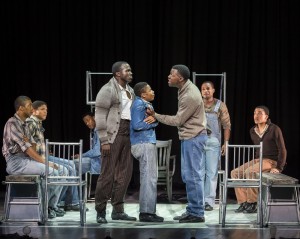 It’s a compelling, maddening, dark, unnerving and dumbfounding story, one which not only highlights a particularly pernicious miscarriage of justice, but also sheds a light on America’s pattern of both racism and accusation-as-guilt. The most astounding thing about the Scottsboro Boys’ story – with its frame-ups, rushed trials, all-white juries, and lynch mobs – is that it has become an original, audacious, and exhilarating (but problematic) new entertainment called The Scottsboro Boys. John Kander, Fred Ebb and librettist David Thompson compacted an intricate series of trials into a one-act musical (1 hour, 45 minutes) that utilizes the antiquated blackface minstrel shows to dramatize a sensational piece of history.
It’s a compelling, maddening, dark, unnerving and dumbfounding story, one which not only highlights a particularly pernicious miscarriage of justice, but also sheds a light on America’s pattern of both racism and accusation-as-guilt. The most astounding thing about the Scottsboro Boys’ story – with its frame-ups, rushed trials, all-white juries, and lynch mobs – is that it has become an original, audacious, and exhilarating (but problematic) new entertainment called The Scottsboro Boys. John Kander, Fred Ebb and librettist David Thompson compacted an intricate series of trials into a one-act musical (1 hour, 45 minutes) that utilizes the antiquated blackface minstrel shows to dramatize a sensational piece of history.
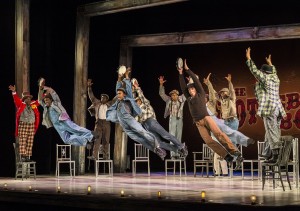 Boys began with a successful off-Broadway run at the Vineyard Theatre, and then bravely transferred to Broadway, but the subject matter kept tourists at bay, and the imaginative musical closed after 49 performances. Even with toe-tapping songs, amazing dance sequences, and both humorous and searing performances, it recounts a gloomy event with a gloomy outcome. The result, however, is hardly depressing – in fact, it’s such an inventive and original work of art, that its creativity lifted my spirits when I first saw it at the Old Globe. I left that production both inspired and satisfied. I still have a major issue with the show (more on that later), which — now that I am familiar with its conceit — drags a bit at the Ahmanson Theatre, where a note-for-note rendering of previous incarnations opened this week. While this musical is better-suited for a more intimate space and there are some sound issues, I suspect first-timers will find the story shocking, the minstrelsy device outlandish, and the bouncy tunes infectious.
Boys began with a successful off-Broadway run at the Vineyard Theatre, and then bravely transferred to Broadway, but the subject matter kept tourists at bay, and the imaginative musical closed after 49 performances. Even with toe-tapping songs, amazing dance sequences, and both humorous and searing performances, it recounts a gloomy event with a gloomy outcome. The result, however, is hardly depressing – in fact, it’s such an inventive and original work of art, that its creativity lifted my spirits when I first saw it at the Old Globe. I left that production both inspired and satisfied. I still have a major issue with the show (more on that later), which — now that I am familiar with its conceit — drags a bit at the Ahmanson Theatre, where a note-for-note rendering of previous incarnations opened this week. While this musical is better-suited for a more intimate space and there are some sound issues, I suspect first-timers will find the story shocking, the minstrelsy device outlandish, and the bouncy tunes infectious.
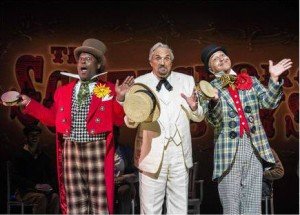 The inimitable Hal Linden plays the Interlocutor (a minstrel troupe’s white emcee) who banters with the “end men” – low-comedy types named Mr. Bones (Trent Armand Kendall) and Mr. Tambo (JC Montgomery). The nine other black performers are also members of this minstrel troupe; they portray the prisoners sans “blackface,” and some play other characters — such as Victoria (Christian Dante White) and Ruby (Gilbert L. Bailey II) — in a minstrel fashion. The minstrel sequences, thrillingly staged by Susan Stroman, are hardly shocking; the bug-eyed, cakewalking, outlandish caricatures of the shuffle-and-grin style are used to reenact the original incident and parts of the trial. While everyone agrees that racial stereotyping can be highly offensive, it’s OK to admit that this verboten style of entertainment is extremely amusing; in fact, Minstrel Shows created the framework for Vaudeville.
The inimitable Hal Linden plays the Interlocutor (a minstrel troupe’s white emcee) who banters with the “end men” – low-comedy types named Mr. Bones (Trent Armand Kendall) and Mr. Tambo (JC Montgomery). The nine other black performers are also members of this minstrel troupe; they portray the prisoners sans “blackface,” and some play other characters — such as Victoria (Christian Dante White) and Ruby (Gilbert L. Bailey II) — in a minstrel fashion. The minstrel sequences, thrillingly staged by Susan Stroman, are hardly shocking; the bug-eyed, cakewalking, outlandish caricatures of the shuffle-and-grin style are used to reenact the original incident and parts of the trial. While everyone agrees that racial stereotyping can be highly offensive, it’s OK to admit that this verboten style of entertainment is extremely amusing; in fact, Minstrel Shows created the framework for Vaudeville.
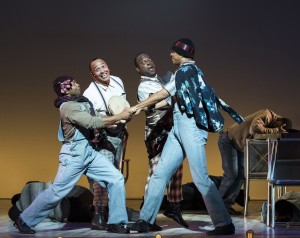 The music undeniably sprouted from the hands of John Kander. While the vamps and bouncy ragtime rhythms may be somewhat derivative of Cabaret and Chicago, his score masterfully manages to be a wholly original pastiche of Depression-era music, written with a knowledge of period style that is unparalleled in musical theater today. Modern musicals suffer largely because the composers are incapable of writing memorable, exciting, fresh songs. The forgettable country and rock-infused scores of most all new musicals don’t even come close to the self-contained songs in a Kander-Ebb musical. I’m not saying this is a great score, as a good many of the tunes simply don’t stick with us, but The Scottsboro Boys is nonetheless a fitting tribute to Ebb, who died in 2004 while writing the show.
The music undeniably sprouted from the hands of John Kander. While the vamps and bouncy ragtime rhythms may be somewhat derivative of Cabaret and Chicago, his score masterfully manages to be a wholly original pastiche of Depression-era music, written with a knowledge of period style that is unparalleled in musical theater today. Modern musicals suffer largely because the composers are incapable of writing memorable, exciting, fresh songs. The forgettable country and rock-infused scores of most all new musicals don’t even come close to the self-contained songs in a Kander-Ebb musical. I’m not saying this is a great score, as a good many of the tunes simply don’t stick with us, but The Scottsboro Boys is nonetheless a fitting tribute to Ebb, who died in 2004 while writing the show.
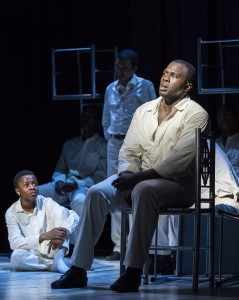 My issue with the musical, and it’s not a tiny one, is that it feels as though the creators were trying too hard to honor the wronged men, crafting the show in such a way that the audience is robbed of making their own decisions about this historical event. Coating the show in minstrelsy may be politically incorrect, yet I sensed political correctness and self-righteousness. In fact, the minstrelsy needs to be expanded. I can imagine the mountains of material that bookwriter Thompson had to pore over, but his dramatization, oddly enough, lacks clarity and feels safe. He used shouting matches between prisoners in their jail cell to hurriedly spew facts about themselves, but they never truly related to each other. We don’t find out who they are. Also, facts such as that one of the boys carried a gun on the train, and that another became a turncoat to his fellow defendants, are glossed over, as if to stress that these poor souls were innocents merely looking for a job. That may or may not have been true, but the drama on stage is lopsided towards victimization when it needed some kind of accountability: What about that brawl that started the whole mess? What caused blameless black boys to hurl white boys from a train in the rural South?
My issue with the musical, and it’s not a tiny one, is that it feels as though the creators were trying too hard to honor the wronged men, crafting the show in such a way that the audience is robbed of making their own decisions about this historical event. Coating the show in minstrelsy may be politically incorrect, yet I sensed political correctness and self-righteousness. In fact, the minstrelsy needs to be expanded. I can imagine the mountains of material that bookwriter Thompson had to pore over, but his dramatization, oddly enough, lacks clarity and feels safe. He used shouting matches between prisoners in their jail cell to hurriedly spew facts about themselves, but they never truly related to each other. We don’t find out who they are. Also, facts such as that one of the boys carried a gun on the train, and that another became a turncoat to his fellow defendants, are glossed over, as if to stress that these poor souls were innocents merely looking for a job. That may or may not have been true, but the drama on stage is lopsided towards victimization when it needed some kind of accountability: What about that brawl that started the whole mess? What caused blameless black boys to hurl white boys from a train in the rural South?
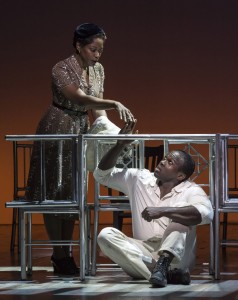 There is an enormous amount of fascinating information from the trials that is not in the show, such as other witnesses’ testimony, physical examinations of the girls who cried “Rape,” and the motivations of the American Communist Party (which largely financed the appeals). As captivating as the musical can be, I found myself wondering at times if this subject matter would not have resounded better in a play. One thing is for sure: Had there been more and better jokes — in the vein of Funny Thing… — I suspect Boys would have been more affecting and less dull at the Ahmanson, and may have even brought in the tourists on Broadway.
There is an enormous amount of fascinating information from the trials that is not in the show, such as other witnesses’ testimony, physical examinations of the girls who cried “Rape,” and the motivations of the American Communist Party (which largely financed the appeals). As captivating as the musical can be, I found myself wondering at times if this subject matter would not have resounded better in a play. One thing is for sure: Had there been more and better jokes — in the vein of Funny Thing… — I suspect Boys would have been more affecting and less dull at the Ahmanson, and may have even brought in the tourists on Broadway.
As America faces issues eerily similar to those in 1931, namely the economy and racism, The Scottsboro Boys is most timely, and definitely should be seen by first-timers. Because of its self-consciousness, this very good musical misses the opportunity to be the “Next Great American Musical.” But a highly-polished production of a good musical is still a far cry better than attending the majority of crass, uninventive, forgettable, and ridiculous new musicals of the last 25 years. I would much rather have The Scottsboro Boys as is than no Boys at all.
photos by Craig Schwartz
The Scottsboro Boys
presented by Center Theatre Group at the Ahmanson Theatre
scheduled to end on June 30, 2013
for tickets, call (213) 972-4400 or http://www.centertheatregroup.org
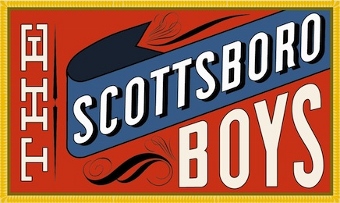

{ 2 comments… read them below or add one }
As always, a well researched review, Tony. The Scottsboro Boys is an amazing, original work of musical theater that either boldly misses its mark or is ahead of its time. (I’m not sure which.) Like Stephen Sondheim’s Passion, the music cannot lift the story out of its tragically hopeless trajectory. And like Passion, the brilliance behind the concept and execution makes it “must-see” musical fare for any aficionado who isn’t afraid to delve into musical drama — which I feel is the new frontier for sung theater. Therefore, despite its flaws, I heartily recommend The Scottsboro Boys to the world as it heralds new possibilities for the somewhat stagnant American musical. Thanks for your thought-provoking review.
They hurled the white boys from the train when the fight was over because the white boys were trying to push them off the train, told them it was a white man’s train, and threw gravel at them (then the train was moving slow enough for them to jump on and off) even though they were all hobos hopping freight trains. They actually pulled one of the white boys back on because by then the train was going too fast for it to be safe. Just wanted to let you know.